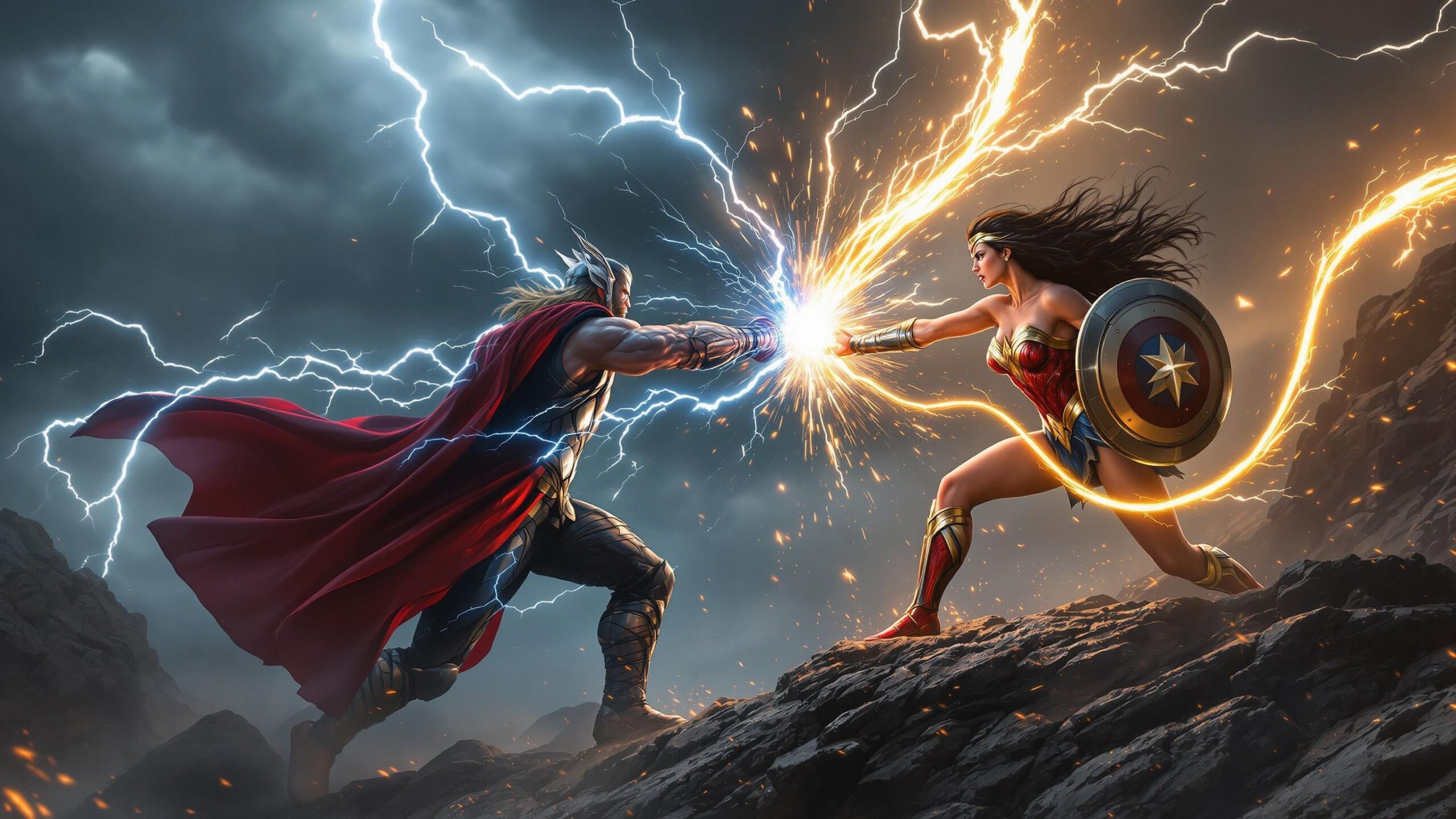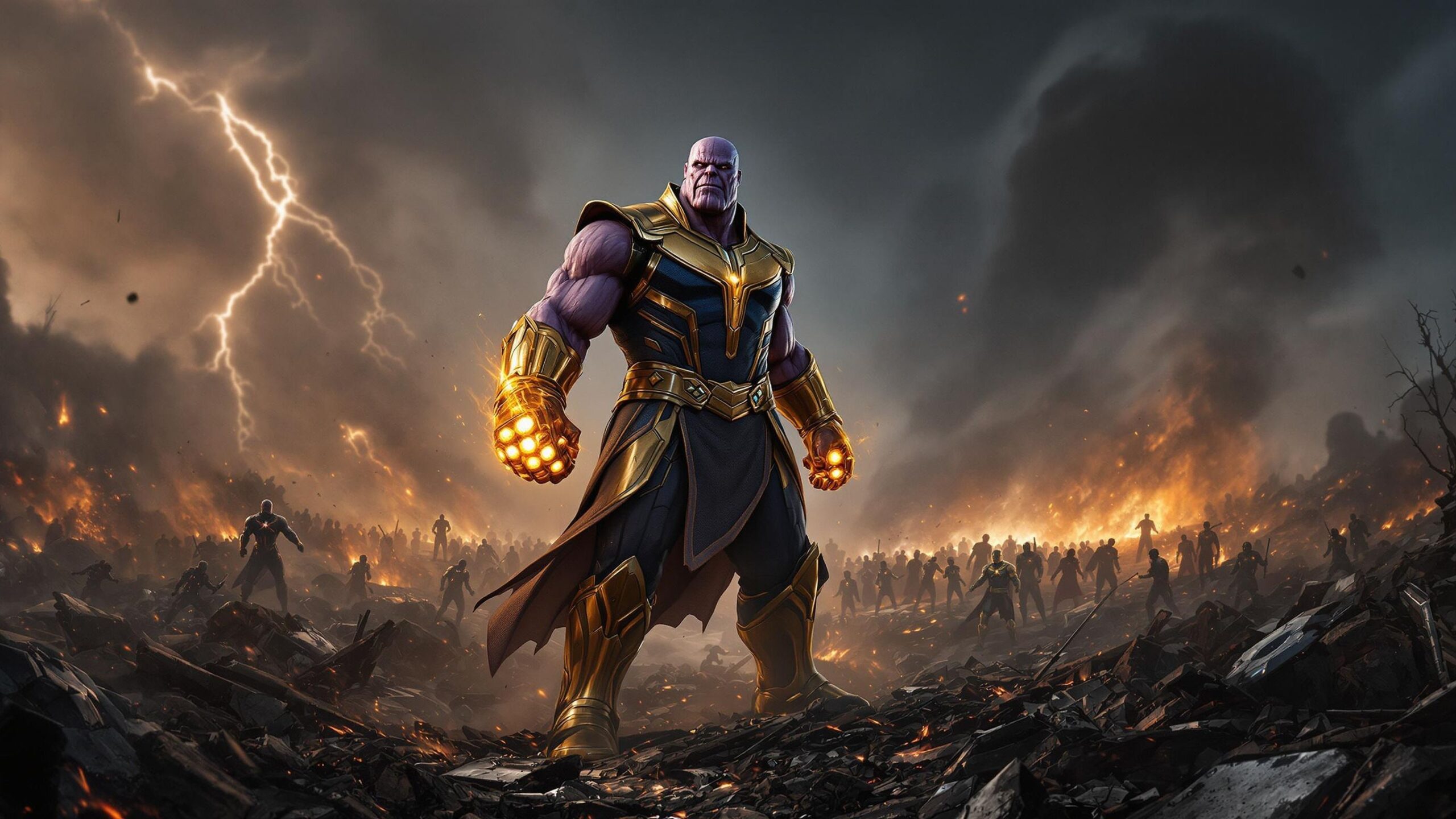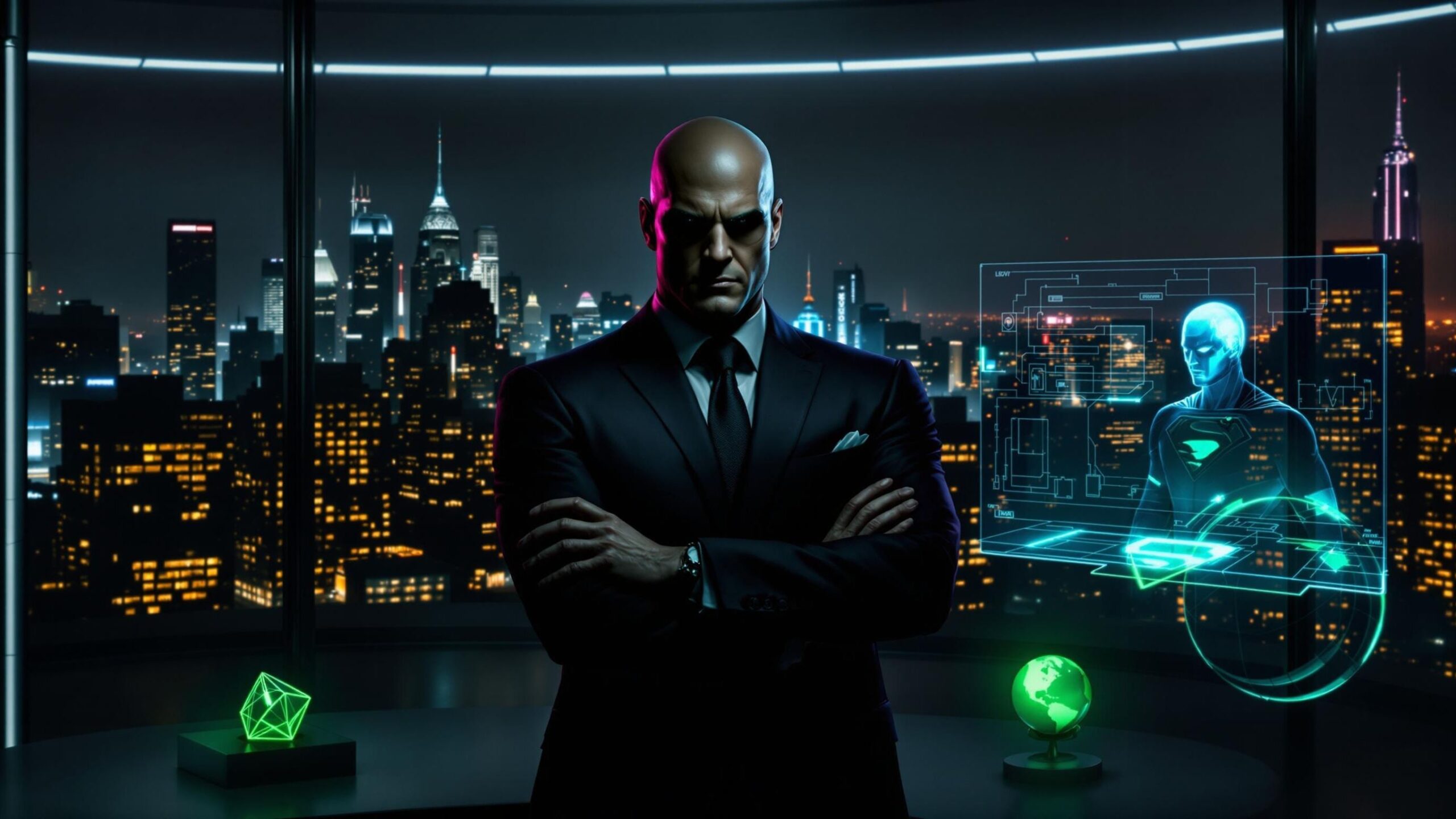What happens when the hammer of a Norse god crashes into the shield of an Amazonian demigoddess? You don’t just get sparks—you get an explosion that could rip open reality itself. Thor Odinson and Diana of Themyscira are among the most powerful beings in their respective universes and putting them head-to-head isn’t just a fan’s fantasy—it’s a narrative detonation waiting to happen. Thor, the crown prince of Asgard, can call lightning from the sky and wrestle frost giants before brunch. Wonder Woman, trained by the gods of Olympus and forged in the fires of war, has gone toe-to-toe with Superman and emerged with her tiara still intact. This isn’t just a battle—it’s a Clash of Gods.
Myths and Origins: Born of Power and Legend
Thor’s mythological roots run deep in the sagas of Norse legend. The son of Odin and the wielder of Mjölnir, he’s been crushing ice giants and squaring off with world-serpents since the Viking age. Marvel’s version keeps that mythological majesty but adds a smirking swagger. Thor is the storm itself in humanoid form—brash, bold, and booming. Yet, beneath the bravado is a noble heart that genuinely wants to protect the realms, even if it means brawling with Hulk or humbling himself before mortals.
Wonder Woman’s tale begins on the mystic island of Themyscira, hidden away from man’s world. Diana was sculpted from clay and given life by the gods—or, in modern versions, born from Zeus himself. Trained by Amazons, she grew up learning every martial discipline imaginable while absorbing lessons in diplomacy, wisdom, and compassion. Wonder Woman isn’t just a warrior—she’s a bridge between gods and humans, war and peace, truth and myth. Where Thor is a tempest, Diana is a force of nature balanced by purpose.
Weapons of the Divine: Hammer vs. Lasso
Thor’s mighty hammer, Mjölnir, is more than just a blunt-force instrument. It’s a cosmic conductor, capable of manipulating weather, opening portals, and only allowing the worthy to lift it. When it spins, it creates cyclones. When it strikes, mountains crumble. And when Thor hurls it, it’s like launching a divine freight train. But his hammer isn’t just brute power—it represents Asgardian heritage, worthiness, and the thunder god’s bond with the storm.
Wonder Woman’s Lasso of Truth is no less iconic. Forged by Hephaestus, it compels truth, slices through lies, and can bind even gods. But that’s just the beginning. She wields a shield capable of withstanding Doomsday’s strikes, a sword sharp enough to cut atoms, and gauntlets that can deflect Zeus’s lightning. Her arsenal is elegance wrapped in lethality—a toolkit of justice that turns any battlefield into her arena.
So, while Thor brings the storm, Wonder Woman brings the storm and strategy. If Mjölnir is thunder, the Lasso is lightning—precise, swift, and impossible to escape.
Strength and Speed: The Godly Stats
Let’s not mince words—both of these characters could lift tanks while reading poetry. Thor’s strength is astronomical. He’s fought the Hulk, wrestled dragons, and even survived the core of a star. He’s essentially a living natural disaster with abs and flowing blond locks. But raw strength isn’t the whole equation. Thor is surprisingly agile for his size, and when he flies via Mjölnir, he becomes a blue-and-gold blur.
Wonder Woman doesn’t just match him—she counters him with speed and grace. Blessed by Hermes, she can move faster than bullets, react in the blink of a god’s eye, and even match the Flash for brief moments. Her strength is often underestimated because of her elegance, but make no mistake—Diana can bench-press skyscrapers and break the jaws of gods. In hand-to-hand combat, she’s one of the most technically skilled fighters in any universe.
So, while Thor may overwhelm with might, Wonder Woman would outmaneuver him with speed, timing, and technique. Their first clash wouldn’t just shake the earth—it might shatter time.
Battle Strategy: Rage vs. Discipline
Thor fights like a god with something to prove. He’s thunder and fury—an overwhelming force who often charges in with booming confidence and a heavy swing. His greatest battles often come from sheer grit and persistence. He learns mid-fight, adapts with instincts, and when Mjölnir is in hand, he can practically rewrite the weather forecast.
But Diana is all about discipline. She doesn’t just fight—she calculates. Her movements are measured, her attacks purposeful. She reads opponents like an open scroll, capitalizing on overconfidence and hesitation. She’s led armies, trained warriors, and knows how to fight gods on their own turf. She doesn’t need the upper hand—she just needs one mistake. And Thor, for all his strength, has made a few of those.
If Thor comes in like a lightning storm, Wonder Woman counters like a master strategist who turns her opponent’s fury against them. It’s not just strength—it’s how you wield it.
Philosophies Collide: Justice vs. Glory
Thor and Wonder Woman aren’t just muscle—they’re symbols. Thor represents the nobility of power tempered by humility. His journey has always been one of growth, from an arrogant prince to a selfless protector. He’s driven by honor, loyalty, and the need to earn his place among mortals and gods alike.
Wonder Woman, on the other hand, is a beacon of compassion within conflict. She’s a warrior, yes, but also a healer. She believes that battles should have purpose and that victory without justice is meaningless. She fights to protect not just lives but the truth itself. Her mission is peace, even when her methods require a sword.
So when they fight, it’s not just a spectacle—it’s a philosophical war. Thor fights to prove his worth. Diana fights to preserve peace. One seeks redemption in battle. The other seeks to end the need for it.
When Worlds Collide: The Ultimate Showdown
Let’s imagine the scene. Thor descends from the sky in a bolt of lightning, Mjölnir in hand, shouting an ancient Asgardian war cry. The clouds darken. The wind howls. Trees are ripped from the earth by the sheer force of his arrival. Across the battlefield stands Wonder Woman, calm and resolute, the Lasso of Truth glowing in her hand. Her shield is up, her eyes focused. She’s faced gods before—she knows what’s coming.
They clash.
Mjölnir crashes into her shield with a deafening boom, sending shockwaves across the battlefield. Diana skids back, digs her heels in, and counters with a spinning kick that sends Thor flying into a boulder. He laughs, thunder rumbling behind his voice, and hurls the hammer again. She dodges, lassos his arm, yanks him mid-flight, and slams him into the ground.
Every move is countered with another. Every strike is met with parry or pain. The earth cracks. Skies break open. Spectators—be they gods or mortals—watch in awe. This isn’t just a fight. It’s a ballet of myth and might.
And neither gives up.
Who Would Win? The Verdict No One Wants to Make
Let’s be honest—there’s no easy answer. Thor has raw elemental power, durability that rivals the Hulk, and enough godly lineage to back up his ego. But Wonder Woman has unmatched combat skill, divine blessings, and a will that doesn’t bend, even under the weight of Olympus.
If the fight went long, Thor’s stamina might give him an edge. But if Diana finds an opening—and she always does—her precision could end it in one perfect strike. If it’s about brute strength, Thor could claim victory. But if it’s about strategy, Diana might just outthink him.
So maybe the real answer isn’t about who would win—but what they might learn from each other. Thor might come to respect Diana’s balance of strength and peace. Diana might find admiration for Thor’s evolving humility and loyalty to his people. In the end, perhaps the only thing greater than their powers is their potential for unity.
Gods Among Us
Thor and Wonder Woman may come from different worlds—Asgard and Themyscira, Marvel and DC—but they share a mythic gravitas that elevates them above mere mortals. They aren’t just warriors. They’re ideals. They represent different kinds of strength—one forged in storm, the other shaped by wisdom. Their clash would be cataclysmic, awe-inspiring, and utterly unforgettable. But beyond the blows and lightning strikes lies something deeper: the reminder that even gods must grapple with what it means to protect, to serve, and to grow.
So the next time someone asks, “Who would win: Thor or Wonder Woman?” maybe the best answer is: We would. Because getting to witness these two legends collide is the kind of myth we live for.




